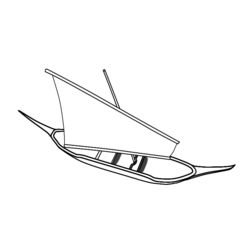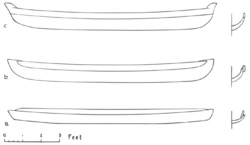Engineering:Jongkong

A jongkong is a type of dugout canoe from Maritime Southeast Asia. Jongkong was the simplest boat from Riau-Lingga area, and can be found widely though in small numbers throughout the area. The first record of jongkong comes from the Malay Annals (which was composed no earlier than the 17th century AD), being used by Majapahit empire during the first Majapahit attack on Singapura (1350)[1] and during the fall of Singapura (1398).[2]
Etymology

The name comes from two words, that is jong and kong or jegong. Jong means a boat or sampan, no matter large or small, while kong or jegong is the place where masts are set up to hold the sail. Thus the name can be translated as a sailing boat that is used by the coastline community.[3]
Description
In this region it is essentially a small, inshore boat and it is rarely built to a length of more than about 12−14 feet (3.7−4.3 m). It is typically a one-man boat, with a length of 9−10 feet (2.7−3 m), with depth at the mid-section about 10−12 inches (25.4−30.5 cm). It consists of a dugout base, with the hull spread slightly, and the sides built up by the addition of a single plank.[4] Larger versions have a small triangular sail, and smaller versions are usually propelled by a short, single-bladed paddle or rarely by a double-bladed paddle.[5]
See also
References
- ↑ Nugroho (2011), p. 271, 399–400, quoting Sejarah Melayu, 5.4: 47: "Maka betara Majapahitpun menitahkan hulubalangnya berlengkap perahu akan menyerang Singapura itu, seratus buah jung; lain dari itu beberapa melangbing dan kelulus, jongkong, cerucuh, tongkang, tiada terhisabkan lagi banyaknya." (So the king of Majapahit ordered his war commander to equip vessels for attacking Singapore, a hundred jong; other than that a few melangbing and kelulus; jongkong, cerucuh, tongkang all in uncountable numbers.)
- ↑ Nugroho (2011), p. 271, 399–400, quoting Sejarah Melayu, 10.4: 77: "... maka bagindapun segera menyuruh berlengkap tiga ratus buah jung, lain dari pada itu kelulus, pelang, jongkong, tiada terbilang lagi." (then His Majesty immediately ordered to equip three hundred jong, other than that kelulus, pelang, jongkong in uncountable numbers.)
- ↑ Darmawan (2012). Tradition of Sailing Boat "Jongkong" Festival in Buru Region, Karimun Regency. Pekanbaru: History Education Fkip-University Of Riau. pp. 4.
- ↑ Gibson-Hill (1969). p.123.
- ↑ Gibson-Hill (1951). p.124.
Further reading
- Gibson-Hill, C.A. (February 1951). "A Note on the Small Boats of the Rhio and Lingga Archipelagos". Journal of the Malaysian Branch of the Royal Asiatic Society. 24: 121–132 – via JSTOR.
- Nugroho, Irawan Djoko (2011). Majapahit Peradaban Maritim. Suluh Nuswantara Bakti. ISBN 978-602-9346-00-8.
 |
